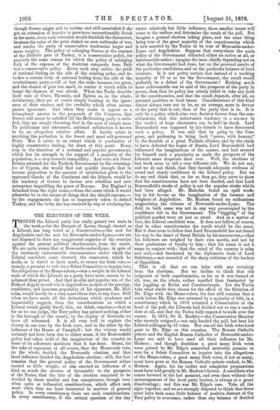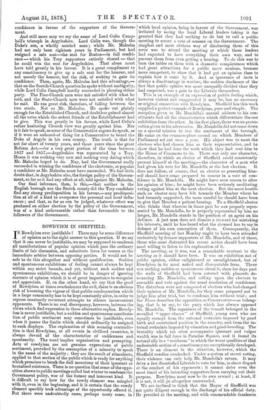THE ELECTIONS OF THE WEEK.
THOUGH the Liberal party has really gained two seats in the week,—for the Marquis of Lorne, though elected as a Liberal, has long voted as a Conservative,—the seat for Argyleshire and the seat for Newcastle-under-Lyme,—we are not disposed to draw any exaggerated auguries of the reaction against the present political charlatanerie, from the result. We are quite aware that at Newcastle-under-Lyme, in spite of the extremely unfavourable circumstances under which the Liberal candidate came forward, the concession which he made, or is stated to have made, to secure the Irish vote,— namely, a promise to vote for a Select Committee to inquire into the allegations of the Home-rulers,—was a weight in the Liberal scale of which the Liberals as a party have more reason to be ashamed than proud. And that an able and popular son of the Duke of Argyle should win in Argyleshire, in spite of the prestige, confidence, and immense popularity of his opponent, Mr. Mal- colm, would hardly be a very marvellous feat, at any time. Still when we have made all the deductions which prudence and impartiality suggest, from the considerations on which a Liberal would gladly dwell, this, we think, remains,—that so far as we can judge, the Tory policy has gained nothing, either in the borough or the county, by the display of fireworks we have all witnessed. It is all very well to explain the victory in one case by the Irish vote, and in the other by the influence of the House of Campbell ; but the victory would certainly not have been due to either cause, if the Beaconsfield policy had taken hold of the imagination of the country as some of its adherents maintain that it has done. Grant, for the sake of argument at all events, that the Home-rule vote, on the whole, decided the Newcastle election, and that local influence decided the Argyleshire election ; still, the fact remains that the general policy of the Government either carried so little weight, or else exerted an influence of a kind so much the reverse of favourable to the prospects of the Tories, that the fate of the election remained to be decided by those smaller and less conspicuous, though very often quite as influential considerations, which affect men most when they are least interested in matters of general policy. In every constituency there are such considerations. In every constituency, if the critical question of the day though Greece might still be restless and still unsatisfied if she exerts relatively but little influence, these smaller issues will come to the surface and determine the result of the poll. But imagine a general election taking place, and the same thing- being true of the great majority of the constituencies which is now asserted by the Tories to be true of Newcastle-under- Lyme and Argyleshire. Suppose that everywhere the main policy of the Government attracted either no notice at all, or unfavourable notice ; imagine the issue chiefly depending not on, what the Government had done, but on the personal merits of the particular candidates, and on the particular balance of local interests. Is it not pretty certain that instead of a working majority of 70 or so for the Government, the result would probably be a defeat of the Government ? Nothing much more unfavourable can be said of the prospects of the party in power, than that its policy has utterly failed to take any hold of the constituencies, and that the result depends, after all, on, personal qualities or local issues. Considerations of this kind almost always turn out to be, on an average, more in favour of the party that is out, than of the party that is in. It is only by a policy which wins very decisive favour from the con- stituencies, that this unfortunate tendency to a see-saw in the verdict of large electorates can be held in check. Lord Beaconsfield was supposed by his friends to have discovered such a policy. It was said that by going to the Con- gress, and professing to bring back "peace, with honour,''' by the flourish of a great Turkish alliance, and by the claim to have defeated the hopes of Russia, Lord Beaconsfield had influenced the imaginations of the masses, and had secured for himself such a popularity as made the prospects of the Liberals more desperate than ever. Well, the elections of last week seem to tell a very different tale. We do not sayr and we do not think, that they furnish adequate evidence of sound and steady confidence in the Liberal policy. But we do say and think that, so far as they go, they serve to show that the constituencies have not been dazzled, and that Lord Beaconsfield's stroke of policy is not the popular stroke which had been alleged. Mr. Malcolm found no spell work- ing in his favour on the imagination of the farmers and burghers of Argyleshire. Mr. Hudson found no enthusiasm magnetising the citizens of Newcastle-under-Lyme. The- field in both cases was not in any way preoccupied by the confidence felt in the Government. The " higgling" of the political market went on just as usual. And as a matter of fact, the Liberal candidate won. It does not follow, of courser that in other constituencies the result would be the same. But it does seem to follow that Lord Beaconsfield has not found his way to the heart of Great Britain by his manceuvres,—that his followers are weighed by their own merits, and not by their professions of loyalty to him ; that his name is not a name to conjure with; that the mind of the country is calm and cool,—not fascinated by the- diplomatic feats of Lord Salisbury,—not resentful of the sharp criticism of the leaders- of Opposition.
That is all that we can infer with any certainty from the elections. But we incline to think that the judgment of both constituencies, so far as it was formed at all, was, on the whole, rather repelled than fascinated by the juggling at Berlin and Constantinople. Let the Tories take what credit they choose for the effect of the flirtation of Mr. Edge with the Home-rulers, the fact still remains that a week before Mr. Edge was returned by a majority of 340, in a constituency which in 1874 returned a Conservative at the head of the poll, the Liberals had decided not to run a candi- date at all, and that the Tories fully expected to walk over the course. In 1874, Sir E. Buckley—the Conservative Member who recently resigned,—not only headed the poll, but beat his Liberal colleague by 57 votes. Nor can all the Irish votes have gone to Mr. Edge on this occasion. The Roman Catholic priests and the English Roman Catholics of Newcastle-under- Lyme are said to have used all their influence for Mr. Hudson; and though doubtless a good many Irish votes- were gained by Mr. Edge's somewhat unworthy promise to vote for a Select Committee to inquire into the allegations of the Home-rulers, a good many Irish votes, if not so many, must have gone as the Roman Catholic priests wished, to Mr. Hudson. Again, his far earlier and completer preparations must have told greatly in Mr. Hudson's favour. A candidate who comes forward at the last moment, and even then without the encouragement of the local party leaders, is always at a great disadvantage ; and this was Mr. Edge's case. Take all the signs together, and we are strongly disposed to think that there must have been some little balance of positive distrust of the Tory policy to overcome, rather than any balance of decided confidence in favour of the supporters of the Govern- ment.
And still more may we say the same of Lord Colin Camp- bell's triumph in Argyleshire. Lord Colin was, though the Duke's son, a wholly untried man ; while Mr. Malcolm had not only been eighteen years in Parliament, but had resigned a safe seat—the seat for Boston—in full confid- ence — which his Tory supporters entirely shared — that he could win the seat for Argyleshire. That alone must have told greatly in his favour. It is a great compliment to any constituency to give up a safe seat for the honour, and not merely the honour, but the risk, of seeking to gain its confidence. Then, again, Mr. Malcolm had this advantage,— that on the Scotch-Church question he spoke without ambiguity, while Lord Colin Campbell hardly succeeded in pleasing either party. The Free-Church men were not satisfied with what he said, and the State-Church men were not satisfied with what he said. He ran great risk, therefore, of falling between the two stools. Not so Mr. Malcolm. He spoke out plainly enough for the Established Church, and doubtless gained almost all the votes which the ardent friends of the Establishment had to give. This was greatly in his favour, while Lord Colin's rather hesitating Church view was greatly against him. Nor is it fair to speak, as some of the Conservative organs do speak, as if it were an unheard-of thing for a Conservative to beard the Duke of Argyle in his own county. The truth is that for not far short of twenty years, and those years since the great Reform Act,—for a very great portion of the time between 1837 and 1857,—Argyleshire was represented by a Tory. Hence it was nothing very new and nothing very daring which Mr. Malcolm hoped to do. Nay, had the Government really succeeded in winning the confidence of the electorate, so popular a candidate as Mr. Malcolm must have succeeded. We feel little doubt that, in Argyleshire also, the foreign policy of the Govern- ment, so far as it had any effect at all, told against Mr. Malcolm. Our final inference, then, is this,—that neither in the English borough nor the Scotch county did the Tory candidate fincLany strong predisposition in his favour,—any predisposi- tion:at all of a kind to overpower the personal and local influ- ences; and that, so far as can be judged, whatever effect was produced on either election by the policy of the Government, was of a kind unfavourable rather than favourable to the followers of the Government.































 Previous page
Previous page